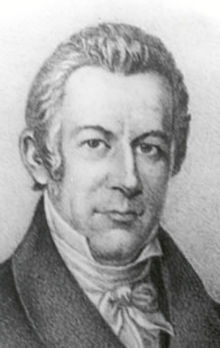William Findlay
William Findlay (born June 20, 1768 in Mercersburg , Franklin County , Province of Pennsylvania , † November 12, 1846 in Harrisburg , Pennsylvania ) was an American politician and from 1817 to 1820 the 4th governor of the state of Pennsylvania.
Early years and political advancement
William Findlay was a brother of John Findlay (1766-1838) and James Findlay (1770-1835), who represented the constituencies of the states of Pennsylvania and Ohio in Congress. He attended the public schools in his home country. He then worked temporarily in agriculture and was a member of the state militia. After studying law, he worked in Franklinton in his new profession.
In 1797 and again from 1804 to 1807 he was a member of the House of Representatives from Pennsylvania . Between 1807 and 1817 he was Minister of Finance ( Treasurer ) of his state. That year he was elected as new governor by the so-called "New School" faction of the Democratic Republican Party . At that time there was a power struggle between two factions within the party. The “New School” advocated protective tariffs, a Bundesbank and a publicly financed expansion of the infrastructure. The other side, the so-called "Old School", campaigned for a restriction of government powers and was against the programs supported by the "New School".
Governor of Pennsylvania
William Findlay took up his new office on December 16, 1817. He was the first governor to serve in the new capital, Harrisburg. Since the government buildings were not yet completed, he did a large part of his work from his private apartment. Because of the hostility between the two wings of his party, he had a hard time. The "Old School" conducted an investigation into Findlay's tenure as finance minister and pushed for his impeachment as governor. This attempt failed, but damaged Findlay's reputation. An economic crisis in 1819 worsened general conditions in the country, which also harmed the governor. In the next election, the "old school" managed to beat Findlay. Therefore, he had to leave office on December 19, 1820.
Another résumé
After his governorship ended, Findlay was elected to the US Senate . There he stayed between 1821 and 1827. In the Senate he was chairman of the Agriculture Committee ( Chairman, Committee on Agriculture ). In the late 1820s he joined the new Democratic Party founded by Andrew Jackson . Between 1827 and 1841 he was director of the United States Mint . He gave up this post in 1841 for health reasons. He then moved to Harrisburg, where he lived with his only daughter until his death in 1846. William Findlay was married to Nancy Irwin.
Web links
- William Findlay in the database of the National Governors Association (English)
- William Findlay ( April 17, 2008 memento on the Internet Archive ) in the Pennsylvania Historical and Museum Commission database
- William Findlay in the Biographical Directory of the United States Congress (English)
- William Findlay in the database of Find a Grave (English)
| personal data | |
|---|---|
| SURNAME | Findlay, William |
| BRIEF DESCRIPTION | American politician |
| DATE OF BIRTH | June 20, 1768 |
| PLACE OF BIRTH | Mercersburg , Pennsylvania |
| DATE OF DEATH | November 12, 1846 |
| Place of death | Harrisburg , Pennsylvania |



